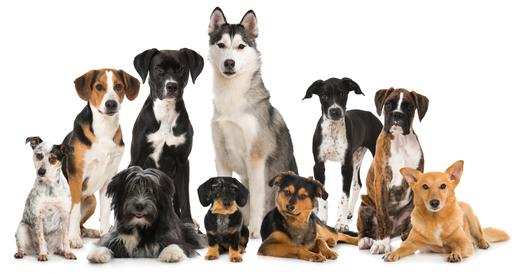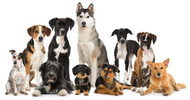Choosing the Right Breed for You
2021 Jun 15th

Practically everyone has a favourite breed of dog, that breed that is especially cute and holds a special place in your heart. From the beautifully marked husky to the so-ugly-it’s-cute Chinese Crested dogs, usually a person’s attraction to a breed is based on their appearance. Chances are you will want to go out and buy one just based solely on what they look like, but have you researched whether that breed will be the right fit for you or your family?
There are as many personalities in dogs as there are in people, within and between breeds.
This may be surprising, but one of the most important parts of choosing a breed is the energy level of the dog versus your energy level. A dog can become destructive, unresponsive to training, and hyper when not given the right amount of exercise! Some dogs, such as Newfoundlands and Saint Bernards are more than happy to laze about all day. However, other breeds, such as huskies and border collies, need to be exhausted and challenged every day to curb their need for exertion. This pent-up energy, if not given an outlet, will release in undesirable ways, such as ripping up your new shoes or being over-excited all the time. For this reason, it is important to do some research and learn which breed will match your energy level. Try looking up dog breed books to give you an idea of what different breeds exist and which is the best for you. For example, golden retrievers are fairly laid back, but still require at least a brisk walk every day and some play to tire them out. On the other hand, some shih tzus will be satisfied just going for a short walk.
If you do want a highly active dog that requires a lot of exercise, but you are relatively sedentary, there are ways of tiring them out such as games like fetch, bringing them for doggy play days, etc. I should also note that working breeds that have high amounts of energy to burn will typically not be satisfied with just a typical walk. A run or game of fetch are more suitable for exercising these breeds.
Another point to consider when looking at a breed is the amount of space required for that breed. Most people assume the bigger the breed, the more space they will need, and vice versa. However, this is an incorrect view in a lot of cases. For example, Newfoundland dogs like to laze around and don’t move around a whole lot, so they can thrive in most situations. I will add that they might not be the best for apartments just based on their sheer size, which is true for all Giant breeds of dogs; a lot of potential to knock things over with their huge heads and tails. On the other hand, Jack Russel terriers are small dogs that require a lot of room and exercise. Breeds like this are small but generally do not thrive cooped up with no room to run around. Keep in mind your housing situation and whether the breed you are looking into will do well in that environment.
A common misconception that I have come across is that a lot of people think that all dogs are the same except for their appearance. However, this is not at all true. There are guard breeds, outgoing breeds, independent breeds, stubborn breeds, intelligent breeds, and so on and so forth. Not even all big dogs have the same, or even similar, personalities. Consider the Saint Bernard and the Great Pyrenees breeds. They are both very large dogs, but one is meant for rescuing people and the other is meant for guarding animals. Saint Bernards were historically used to rescue people in the snow from avalanches. Because this is what they have been bred for, they love people and are typically very friendly. A Great Pyrenees dog has been bred to guard a flock of sheep. This means that they generally prefer to be out pacing the perimeter of your yard than cuddling with you on the couch. There are always exceptions among breeds, of course, but it is important to research a breed to have an idea of what you are getting into.
Take into account who your family dynamic includes before going out and adopting a breed. Is the dog you are considering good with children? What about cats or other small animals? Do you want them to be a guard dog, or friendly with strangers? Some breeds, especially hunting and guarding breeds, can have conflicts with other animals in the house or other people not in living in your house that come over, including friends and family. Do some research to ensure that the breed you want is going to meld well with everyone else that will be interacting with them. It is never fun to have to designate one half of the house to the cat and the other to the dog because they do not get along. Also, these considerations apply to cats as well, not just dogs!
Even within breeds, personalities can differ. For example, a golden retriever from a puppy mill is much more hyper and requires more work than a golden from a reputable breeder, which tend to be more mellow and laid back, but still excitable. If you are getting a puppy, make sure you know the parents of the puppy, that you like them, that they are in good health, and that they are the personality you are looking for. Just like people, puppies take after their parents! This is a very important topic will cover it in more detail in a later blog post. If you are rescuing a dog, try and spend time with them and get as much information about their history as possible before bringing them home. Some shelter dogs may have behavioural problems that need to be tackled, or even health problems, so make sure you will be able to handle or help them.
It is a sad truth, but there are a lot of dogs that end up in shelters due to people misjudging a breed. A husky that had too much energy for them to handle, a Great Dane that grew larger than they were prepared for, or a German shepherd that was too protective of their family. Remember, a dog is a commitment for their entire life! Making sure a particular dog is a fit for you is important for your happiness and sanity, as well as theirs.

